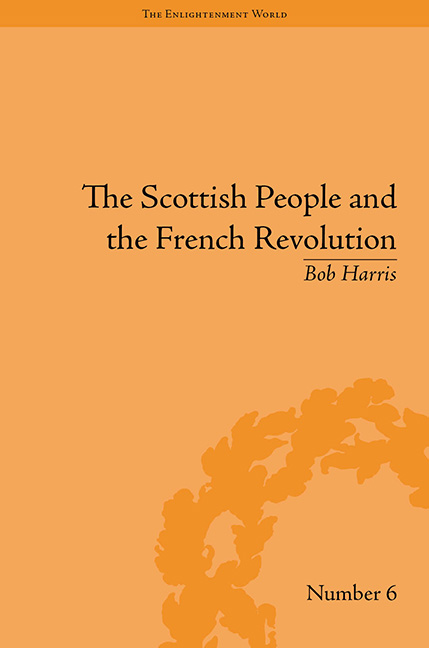Book contents
- Frontmatter
- CONTENTS
- Preface
- Introduction
- 1 The Eighteenth-Century Roots of Scottish ‘Jacobin’ Politics
- 2 Newspapers, the French Revolution and Public Opinion
- 3 ‘The True Spirit of Liberty’: Scottish Radicals, 1792–4
- 4 Checking the Radical Spirit
- 5 Volunteers, the Militia and the United Scotsmen, 1797–8
- 6 Bread, Dearth and Politics, 1795–1801
- Conclusion
- Notes
- Works Cited
- Index
5 - Volunteers, the Militia and the United Scotsmen, 1797–8
- Frontmatter
- CONTENTS
- Preface
- Introduction
- 1 The Eighteenth-Century Roots of Scottish ‘Jacobin’ Politics
- 2 Newspapers, the French Revolution and Public Opinion
- 3 ‘The True Spirit of Liberty’: Scottish Radicals, 1792–4
- 4 Checking the Radical Spirit
- 5 Volunteers, the Militia and the United Scotsmen, 1797–8
- 6 Bread, Dearth and Politics, 1795–1801
- Conclusion
- Notes
- Works Cited
- Index
Summary
The years 1797–8 present the historian with sharply contrasting, at times seemingly downright contradictory, images of the state of Scottish public opinion and political and social stability. Britain appeared in this period to stumble from crisis to crisis. In December 1796, a French fleet evaded Britain's navy to rendezvous off Bantry Bay on the Cork coast, thereby reviving, and in a very dramatic manner, the prospect of a French invasion of the British Isles. In February 1797, against the background of the alarm created by this threat, the Bank of England was forced to suspend payments in specie; Scottish banks were compelled immediately to follow suit. This was quickly followed by mutinies in the navy at the Nore and Spithead. The north of Ireland was placed under military rule, as Dublin Castle struggled to contain the spread of disaffection in Ulster. The war against France saw further military failure and diplomatic isolation, with Spain allying with France in October 1796 and the withdrawal of Austria from the conflict in the subsequent year. Naval victories at St Vincent and Camperdown in 1797 and at the battle of the Nile in 1798 were rare bright points. Peace overtures on the part of the Pitt ministry were rebuffed by the French in 1796 and 1797. In early 1798 a massive invasion force took shape in the French Channel ports, while in August Ireland erupted in bloody rebellion.
In Scotland, 1797 began with a new campaign of defensive military mobilization, which proceeded in fits and starts during 1797–8 and continued until the end of the war (1801). The initial emphasis was on a further expansion of volunteering, but this was quickly joined by other ways of preparing to repell the French. As in 1794–5, the newly-introduced system of lords lieutenant played a key strategic role in leading and organizing the defensive patriotic reaction in the counties, in response to direction from Whitehall.
- Type
- Chapter
- Information
- The Scottish People and the French Revolution , pp. 147 - 184Publisher: Pickering & ChattoFirst published in: 2014

